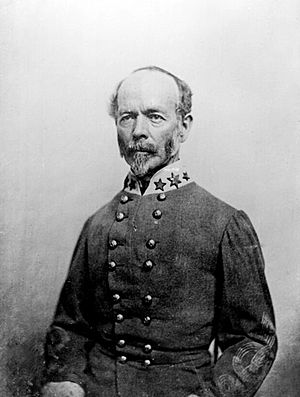Army of the Shenandoah (Confederate) facts for kids
Quick facts for kids Army of the Shenandoah |
|
|---|---|

Joseph E. Johnston
|
|
| Active | May 1861 – July 1861 |
| Country | |
| Allegiance | |
| Branch | |
| Type | Field army |
| Role | Confederate army in Eastern Theater |
| Engagements | Battle of Hoke's Run First Battle of Bull Run |
| Commanders | |
| Notable commanders |
Joseph E. Johnston |
The Army of the Shenandoah was a special group of soldiers from the Confederate States Army during the American Civil War. It was formed to protect the important Shenandoah Valley in Virginia from attacks by the Union Army. This army only took part in one big battle, the First Battle of Bull Run, before it joined with another Confederate army.
Contents
History of the Army of the Shenandoah
How the Army Started
The Army of the Shenandoah began with small groups of soldiers. These groups were sent to take control of Harpers Ferry, a town in Virginia (now West Virginia). To help organize and train these soldiers, Robert E. Lee, a Virginia state commander, put Thomas J. Jackson in charge. Jackson created five groups of infantry (foot soldiers) and one group of artillery (cannons). This was the start of the famous Stonewall Brigade.
On May 15, 1861, Joseph E. Johnston took over command at Harpers Ferry. He continued to receive more soldiers from different parts of the Confederacy. Eventually, he had four large groups of infantry, called brigades, and a special group of cavalry (soldiers on horseback), the 1st Virginia Cavalry, led by J. E. B. Stuart.
Facing the Union Army
In the middle of June, Union forces, led by Robert Patterson, started moving towards Harpers Ferry. Johnston worried that the town was hard to defend. So, he destroyed the bridges and as much equipment as possible in Harpers Ferry. Then, he moved his army south to Winchester. Patterson stayed near the Potomac River and did not chase Johnston's army.
For the next few weeks, both armies watched each other. They only fought one small battle, at Falling Waters, on July 2. After getting more soldiers, Patterson started moving towards Winchester again. But he only went about 5 miles (8 km) before he met Stuart's cavalry, who were watching Johnston's army. Patterson stopped and talked to his officers. They told him to be careful. Also, some of his soldiers were supposed to leave the army soon and refused to stay longer. Because of this, Patterson decided not to attack.
Moving to Bull Run
This pause allowed Johnston to follow new orders he received on July 18. He was told to move his army to help P. G. T. Beauregard's Army of the Potomac at Manassas Junction. This move started that evening. Each brigade marched to Piedmont, where they boarded a train to Manassas Junction. Since there was only one train, the brigades arrived one at a time. The artillery and cavalry had to march all the way. The last of Johnston's soldiers arrived on the afternoon of July 21.
The First Battle of Bull Run
Because Johnston was a higher-ranking officer than Beauregard, he took command of both armies. Before Johnston arrived, Beauregard had planned an attack on the Union army, led by Irvin McDowell, across Bull Run. Johnston approved this plan. However, the orders were not clear, which confused the commanders and stopped the attack from happening as planned.
On the morning of July 21, McDowell's Union army launched its own attack. The battle became very intense around Matthews Hill and Henry House Hill. More and more Confederate brigades were sent to this area. Eventually, all four of Johnston's brigades and four of Beauregard's eight brigades were fighting there. It was during the defense of Henry House Hill that Jackson earned his famous nickname, "Stonewall." This name also became the name of his brigade.
After the Battle
After the battle, Johnston's and Beauregard's armies were combined. The new, larger army was still called the "Army of the Potomac." Johnston remained in charge of this combined army. Beauregard stayed as the second-in-command until he was moved to fight in the western part of the war.
See also
 In Spanish: Ejército del Shenandoah para niños
In Spanish: Ejército del Shenandoah para niños
- First Bull Run Confederate order of battle
 | Calvin Brent |
 | Walter T. Bailey |
 | Martha Cassell Thompson |
 | Alberta Jeannette Cassell |

